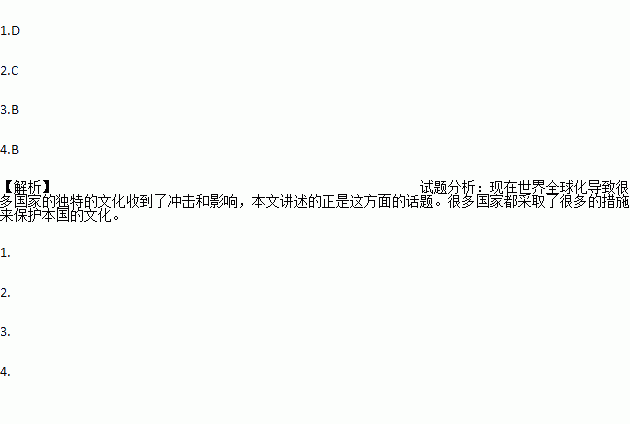题目内容
One of the main challenges facing many countries is how to maintain their identity in the face of globalization and the growing multi-language trend. "One of the main reasons for economic failure in many African countries is the fact that, with a few important exceptions, mother-tongue education is not practiced in any of the independent African states." said Neville Alexander, Director of the Project for the Study of Alternative Education in South Africa at the University of Cape Town.
In response to the spread of English and the increased multi-language trends arising from immigration, many countries have introduced language laws in the last decade. In some, the use of languages other than the national language is banned in public spaces such as advertising posters. One of the first such legal provisions(规定) was the 1994 "Toubon law" in France, and the idea has been copied in many countries since then. Such efforts to govern language use are often considered as futile by language experts, who are well aware of the difficulty in controlling fashions in speech and know from research that language switching among bilinguals is a natural process.
It is especially difficult for native speakers of English to understand the desire to maintain the "purity" of a language by law. Since the time of Shakespeare, English has continually absorbed foreign words into its own language. English is one of the most mixed and rapidly changing languages in the world, but that has not been a barrier to acquiring superiority and power. Another reason for the failure of many native English speakers to understand the role of the state regulation is that it has never been the Anglo-Saxon way of doing things. English has never had a state-controlled authority for the language, similar, for example, to the Academic Francaise in France.
The need to protect national languages is, for most western Europeans, a recent phenomenon-------especially the need to ensure that English does not unnecessarily take over too many fields. Public communication, education and new ways of communication promoted by technology, may be key fields to defend.
1.Neville Alexander believes that __________.
A. mother-tongue education is not practiced in all African countries
B. globalization has resulted in the economic failure of Africa
C. globalization has led to the rise of multi-language trend
D. lack of mother-tongue education can lead to economic failure
2.The underlined word "futile" (in paragraph 2) most probably means " ___________".
A. workable B. practical
C. useless D. unnecessary
3.What can we infer from the last paragraph?
A. English has taken over fields like public communication and education.
B. Many aspects of national culture are threatened by the spread of English.
C. Most language experts believe it is important to promote a national language.
D. Europeans have long realized the need to protect a national language.
4.The best title for the passage is __________.
A. Fighting against the rule of English
B. Protecting local languages and identities
C. Globalization and multi-language trend
D. To maintain the purity of language by law
 名校课堂系列答案
名校课堂系列答案
